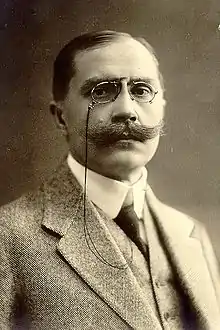Eduard Vilde | |
|---|---|
 Vilde in 1911 | |
| Born | 4 March [O.S. 20 February] 1865 Poidifer, Kreis Wierland, Governorate of Estonia, Russian Empire (present-day Pudivere, Väike-Maarja Parish, Lääne-Viru County) |
| Died | 26 December 1933 (aged 68) Tallinn, Estonia |
| Occupation | Writer |
| Nationality | Estonian |
| Period | 1880–1933 |
| Signature | |
 | |
Eduard Vilde (4 March [O.S. 20 February] 1865 – 26 December 1933) was an Estonian writer, a pioneer of critical realism in Estonian literature, and a diplomat. He was the author of classics such as The War in Mahtra and The Milkman from Mäeküla. He was one of the most revered figures in Estonian literature and is generally credited as being the country's first professional writer.[1]
Life and career
Vilde grew up on the farm where his father worked. In 1883 he began working as a journalist. He spent a great deal of his life traveling abroad and he lived for some time in Berlin in the 1890s, where he was influenced by materialism and socialism. His writings were also guided by the realism and naturalism of the French writer Émile Zola (1840–1902).[2] In addition to being a prolific writer, he was also an outspoken critic of Tsarist rule and of the German landowners. With the founding of the first Estonian republic in 1919, he served as an ambassador in Berlin for several years,[3] and spent the last years of his life editing and revising an enormous volume of his collected works. After his death in 1933, he became the first person to be interred at Metsakalmistu, in the Pirita district of Tallinn.
Works
- Musta mantliga mees (1886)
- Kuhu päike ei paista (1888)
- Kõtistamise kõrred (1888)
- Karikas kihvti (1893)
- "Linda" aktsiad (1894)
- Külmale maale (1896)
- Raudsed käed (1898)
- Mahtra sõda (1902)
- Kui Anija mehed Tallinnas käisid (1903)
- Prohvet Maltsvet (1905–1908)
- Jutustused (1913)
- Mäeküla piimamees (1916)
- Tabamata ime (1912)
- Pisuhänd (1913)
- Side (1917)
- Rahva sulased (unfinished, Looming 1934/1–3)
- story Jobu
- Minu esimesed triibulised
Gallery
 Statues of Oscar Wilde and Eduard Vilde in Galway. The original of this sculpture is located in Tartu.
Statues of Oscar Wilde and Eduard Vilde in Galway. The original of this sculpture is located in Tartu. Vilde on a 1965 Soviet stamp
Vilde on a 1965 Soviet stamp House in Kadriorg, where Eduard Vilde lived from 1927 to 1933
House in Kadriorg, where Eduard Vilde lived from 1927 to 1933 Grave of Eduard Vilde at Tallinn's Forest Cemetery
Grave of Eduard Vilde at Tallinn's Forest Cemetery Monument of Vilde in the park at Muuga Manor
Monument of Vilde in the park at Muuga Manor Memorial to Vilde in Tallinn
Memorial to Vilde in Tallinn
References
- ↑ ELIC. "A Short History of Estonian Literature". The creation of 'our own' literature in the 19th century. Estonian Literature Information Centre. Retrieved 14 March 2012.
- ↑ Peter Melville Logan, Olakunle George, Susan Hegeman, Efraín Kristal (2011). The Encyclopedia of the Novel, Vol. 1. John Wiley and Sons. p. 88. ISBN 978-1405161848.
{{cite book}}: CS1 maint: multiple names: authors list (link) - ↑ Sheeran, Paul (2007). Literature and international relations: stories in the art of diplomacy. Ashgate Publishing. p. 118. ISBN 978-0754646136.
External links
 Media related to Eduard Vilde at Wikimedia Commons
Media related to Eduard Vilde at Wikimedia Commons